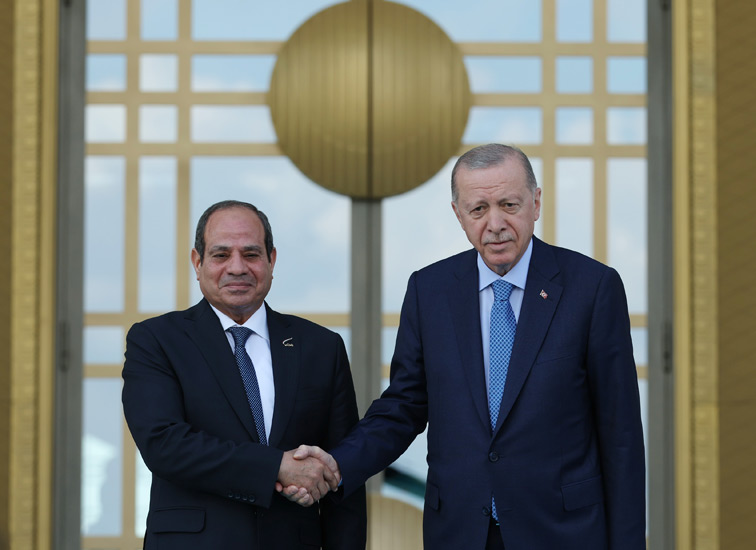Turkey’s Abrupt Shifts in Foreign Policy
Han Ha-eun(SNUAC)
On September 4, Egyptian President Abdel Fattah el-Sisi, who came to power through a coup, met with AKP’s Recep Tayyip Erdoğan in Ankara, marking the restoration of relations after 12 years of estrangement. The rupture between the two countries was triggered by the ousting of Mohamed Morsi, a member of the Muslim Brotherhood, who had risen to power in Egypt during the Arab Spring, only to be removed by el-Sisi’s coup. Turkey’s strong support for Hamas in the Israel-Palestine issue has resulted only in establishing open communication channels between Hamas and Iran, while the planned strategic energy agreement with Israel has been canceled. In reality, Turkey’s foreign policy, centered on religious, Islamist-based diplomacy with Middle Eastern countries, brought significant political and economic losses. Erdoğan acknowledged in 2022 that the low-interest-rate policy, based on Islamic values, had crippled the economy. He also realized the need for change, especially as public distrust of the AKP became evident ahead of the May 2024 general elections. Erdoğan reconciled with Saudi Crown Prince Bin Salman in 2022, despite their prior conflict over the murder of journalist Jamal Khashoggi. He also mended relations with UAE President Bin Zayed, with whom ties were severed over allegations of supporting the failed coup attempt by Gülenists. There are also cautious reports suggesting a potential shift in relations with Syrian President Assad. Notably, Washington sources have reported joint exercises between Turkey’s sole amphibious assault ship, TCG Anadolu, and the USS Wasp, which the U.S. deployed to the Eastern Mediterranean to “enhance Israel’s security.” Furthermore, it has been reported from Moscow that Erdoğan has accepted an invitation to attend the BRICS summit in Kazan, the capital of Russia’s Tatarstan Republic, from October 22-24. The concern is that these foreign policy shifts are being heard from external sources rather than the Turkish government itself. There may be various reasons for keeping these changes under wraps, such as avoiding questions about the abrupt shifts or a desire to avoid conflict with anyone before the U.S. presidential election in November. Erdoğan is expected to skillfully maintain Turkey’s pivotal geopolitical position, crucial for shaping the balance of power in the Eastern Mediterranean.
급격한 외교정책의 변화를 보이는 튀르키예
한하은(아시아연구소)
쿠데타로 이집트 대통령에 오른 엘시시와 AKP의 에르도안은 앙카라에서 9월 4일 만났다. 단절되었던 관계가 12년 만에 다시 회복되는 시점이다. 무슬림형제단 출신 무르시가 아랍의 봄을 통해 정권을 얻었지만 엘시시의 쿠데타로 인해 퇴각된 것이 이집트와의 단절의 이유였다. 이스라엘과 팔레스타인 문제에서 적극적으로 하마스를 옹호했던 튀르키예의 결실은 하마스와 이란과의 열린 소통 채널을 갖는 것에만 국한되어 있고 예정되어 있던 전략적 에너지 협정은 파기 되었다. 실제로 이슬람주의 중심의 대중동 외교정책이 튀르키예에게 막대한 정치·경제적 손실을 주었다. 에르도안은 2022년 이슬람 가치를 기반으로 한 저금리 기조가 경제를 좌초시켰다고 인정했고 무엇보다 2024년 5월 총선에서 자신과 AKP에 대한 국민의 불신을 보면서 변화의 필요성을 인지했다. 언론인 자말 카슈끄지 살해사건을 놓고 대립해온 사우디 왕세자 빈살만과 에르도안은 2022년 사우디에서 손을 잡았다. 또한 귤렌의 쿠데타 시도를 지원한 혐의로 단절했던 UAE 무함마드 빈 자이드 대통령과도 화해했다. 시리아 대통령 아사드와의 관계에도 변화가 있을 것이라는 소식도 조심스럽게 들려온다. 무엇보다 워싱턴 소식통에 의하면 튀르키예의 유일한 상륙 강습함 TCG Anadolu와 미국이 ‘이스라엘의 안보를 강화’하기 위해 동지중해로 보낸 상륙함 USS Wasp의 ‘합동훈련’ 소식이다. 10월 22-24일 러시아 타타르스탄 연방 공화국의 수도인 카잔에서 열리는 BRICS 정상회의에 초대를 받고 튀르키예가 초대를 수락했다는 소식도 모스크바에서 전해졌다. 문제는 변화된 외교정책을 튀르키예 정부가 아닌 외부에서 소식을 들을 수 있다는 것이다. 숨기는 이유는 여러 가지가 있겠지만 급격한 변화에 대한 의문을 피하기 위해서도 있겠고 11월 미국 대선 전까지 누구하고도 충돌하고 싶지 않은 속내도 읽힐 수 있다. 튀르키예 없이는 동지중해에서 방정식을 세울 수 없는 지정학적 위치를 에르도안이 잘 지켜내길 바란다.

